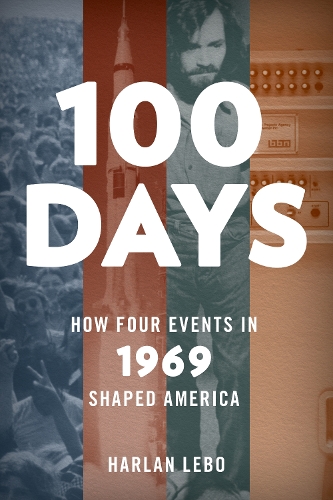
100 Days: How Four Events in 1969 Shaped America
(Hardback)
Publishing Details
100 Days: How Four Events in 1969 Shaped America
By (Author) Harlan Lebo
Bloomsbury Publishing PLC
Rowman & Littlefield Publishers
28th June 2019
United States
Classifications
General
Non Fiction
Popular culture
973.92
Physical Properties
Hardback
368
Width 159mm, Height 239mm, Spine 30mm
726g
Description
Some events that transform a nation are frozen in time. Others pass with little public awareness, and we only appreciate their momentous nature long after they occur. Regardless, these events are few andalmost alwaysfar between. But in 1969, four such events took place within the span of only 100 days. In this book, cultural historian Harlan Lebo looks back at the first moon landing, the Manson family murders, Woodstock, and the birth of the Internet to tell the story of how each event shaped the nation and how we perceive ourselves. Loaded with captivating anecdotes and insights based on extensive interviews with eyewitnesses and participants, to provide historical insight and contemporary context, 100 Days will fascinate readers who seek a deeper appreciation of how four seemingly unrelated events shaped Americas emergence as the nation we have become.
Reviews
Correlating a series of vignettes under four topical headings"Moon," "Manson," "Woodstock," "Internet"Lebo (cultural historian, USC Annenberg School for Communication and Journalism) attempts to reveal how four events transformed the American experience. Looking at each event from a cultural historian's perspective, Lebo exposes the technological progress of a nation challenged, the greatest and worst of humanity, and the frightening yet exhilarating change new modes of socialization and e-commerce have wrought. What makes this narrative unique and worthy of study is the temporal setting in which all four events took placea mere 100 days. More important than the exposure of four events is the exposure of cultural bases of the events. The connectivity is exemplified by bringing together various programs in response to a presidential challenge, an accomplishment that has become, as Lebo writes in chapter 11, "so commonplace that it is no longer noticed. Both the worst of individuals (Manson) and the best of gatherings (Woodstock) have become integral to the US vernacular and individualized iconic symbols. Such seemingly disconnected events reveal the necessity of returning to Crevecoeurs 18th-century question: What is an American * Choice Reviews *
Lebo digs deeply into the context and history of each [event]: the political energy behind space exploration, Charles Mansons psychology, the lives and experiences of Woodstock attendees, and the internets technical history and commercial influence. . . . [T]hose new to the period will find this account edifying. * Publishers Weekly *
Just as Neil Armstrong rocketed towards the moon in July of 1969, Lebo boldly bursts through the past into the present. . . . As [Lebo] leads the reader through these 100 days, the reader comes to recognize that the many conveniences and ills which impact us today can be traced back to those four historic moments. * Booktrib *
What sets [100 Days] apart . . . is that Lebo looks closer at then-major names and at the everyman players, both who had pinky-fingers on what happened. These are the people who were almost headline-makers, who had remarkable front-row seats before slipping back into the crowd. History doesnt always recall those bit-players; Lebo does, and thats where readers will find the best parts of 100 Days. Theres why youll want to check this book on your list. -- Terri Schlichenmeyer, Syndicated Columnist
How can one author authoritatively and engagingly write about four such disparate events Harlan Lebo tells the political, scientific, and popular story of how the United States came from behind to be the first nation to put footprints on the moon, then effortlessly shifts to true crime writer, describing how sociopath Charles Manson could suck lost young souls into his web of ultraviolence. Pivot again to Woodstock, the Baby Booms symbol of the utopian society that might have been, and finally towait for itthe invention of the Internet. Lebo deals with technical subjects with deftness and in a style that is at once succinct and entertaining. And, believe it or not, he connects the dots of these world-changing events that all happened in a span of 100 days in 1969. Far out! -- Wade Lawrence
There have been a number of books focused on the Moon Landing, Woodstock, the Manson Murders and the beginning of the of the Internet. Only Harlan Lebo has weaved those stories together as a master story teller to look at the common themes and how they define the end of the 1960s. Through Lebo's eyes, these events, coming a year after the nation's political and social fabric was torn apart in 1968, represent the beginning of a new age. These events share more than a calendar year; they signify the opening of a new chapter in American history. -- Jeffrey Cole, Director, Center for the Digital Future at USC Annenberg School
Author Bio
Cultural historian Harlan Lebo is a senior fellow at the Center for the Digital Future at the USC Annenberg School for Communication and Journalism. His previous books include Citizen Kane, Casablanca: Behind the Scenes, The Godfather Legacy, and Citizen Kane: A Filmmakers Journey. He resides in Los Angeles.
